Project Report: Domestic Violence's Impact on Children's Education
VerifiedAdded on 2023/04/23
|16
|5187
|310
Report
AI Summary
This report examines the impact of domestic violence on children's academic performance, particularly in developing nations like Bhutan, where low literacy rates and limited educational opportunities exacerbate the problem. It defines domestic violence, highlighting its disproportionate impact on women and children, and discusses its adverse effects on children's psychosocial needs and academic achievement. The report emphasizes the importance of a safe domestic environment for academic success and notes the challenges faced by children in violent homes, especially in resource-constrained settings. Using thematic analysis of relevant literature, the report explores the prevalence of domestic violence in Bhutan and other Asian countries, linking it to societal norms and gender inequality. It further discusses the purpose of education in equipping children with skills for future success and underscores the detrimental effects of domestic violence on their physical and mental well-being, which in turn affects their academic performance. The report concludes by advocating for interventions to mitigate the impact of domestic violence on children's education.
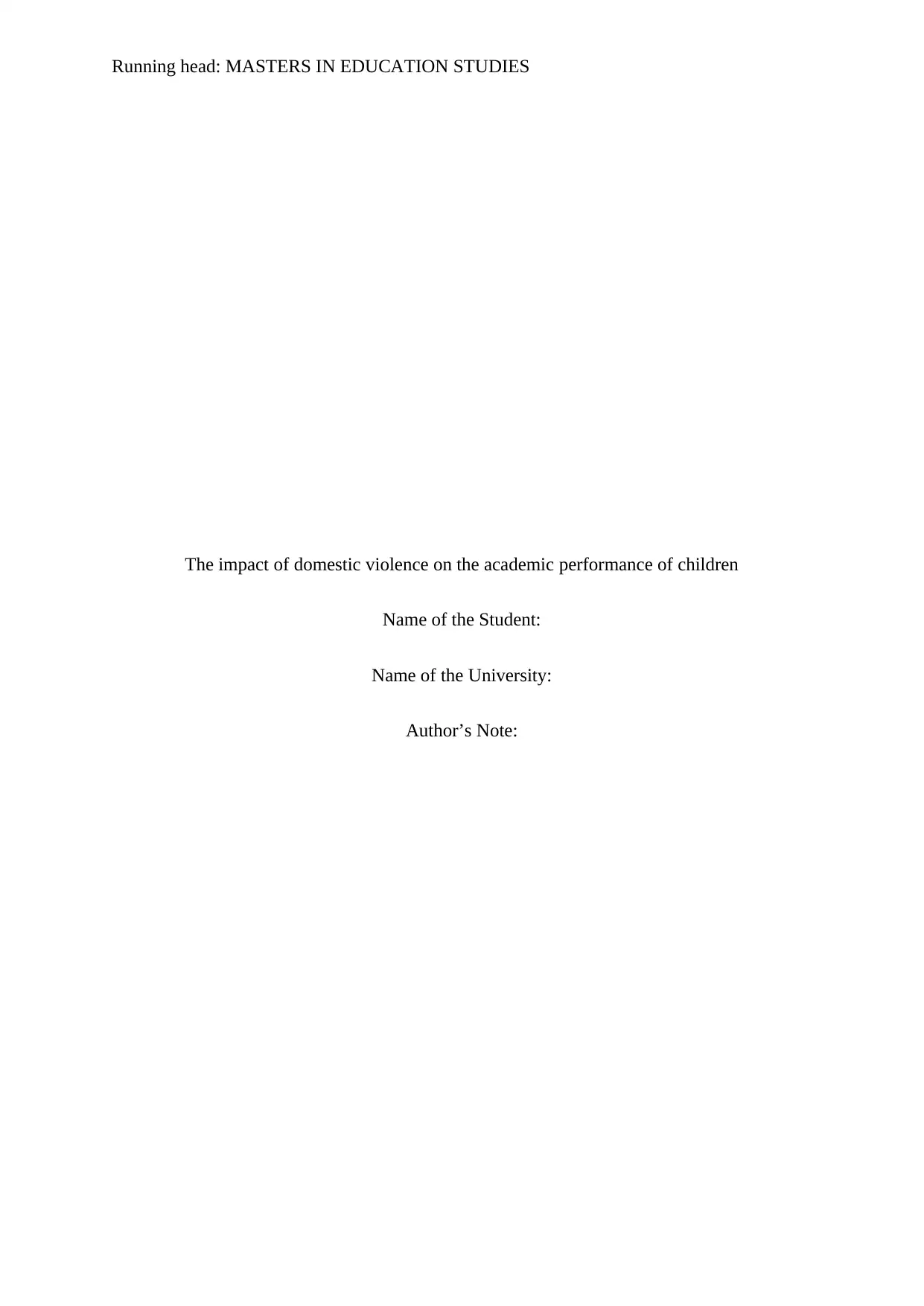
Running head: MASTERS IN EDUCATION STUDIES
The impact of domestic violence on the academic performance of children
Name of the Student:
Name of the University:
Author’s Note:
The impact of domestic violence on the academic performance of children
Name of the Student:
Name of the University:
Author’s Note:
Paraphrase This Document
Need a fresh take? Get an instant paraphrase of this document with our AI Paraphraser
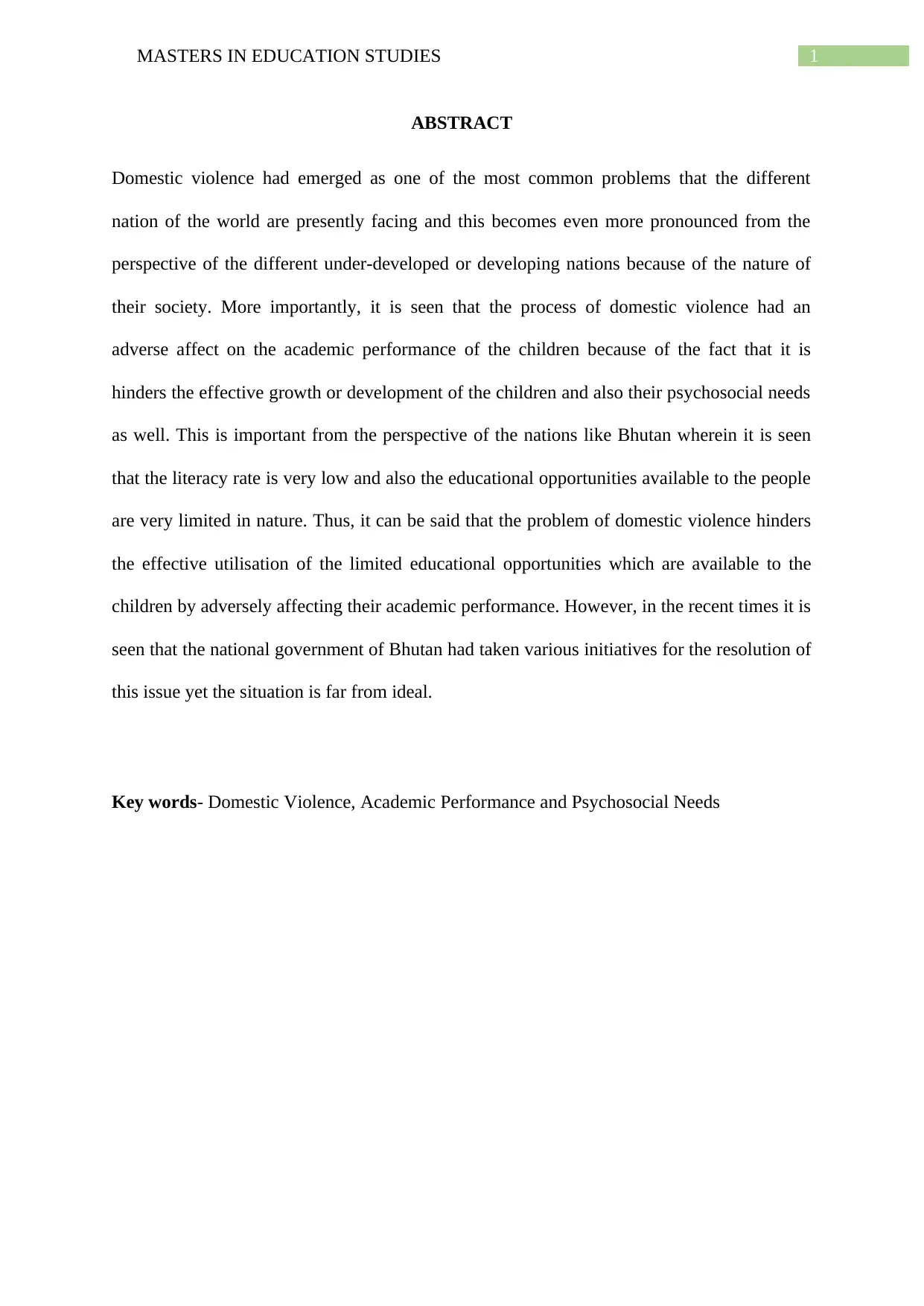
1MASTERS IN EDUCATION STUDIES
ABSTRACT
Domestic violence had emerged as one of the most common problems that the different
nation of the world are presently facing and this becomes even more pronounced from the
perspective of the different under-developed or developing nations because of the nature of
their society. More importantly, it is seen that the process of domestic violence had an
adverse affect on the academic performance of the children because of the fact that it is
hinders the effective growth or development of the children and also their psychosocial needs
as well. This is important from the perspective of the nations like Bhutan wherein it is seen
that the literacy rate is very low and also the educational opportunities available to the people
are very limited in nature. Thus, it can be said that the problem of domestic violence hinders
the effective utilisation of the limited educational opportunities which are available to the
children by adversely affecting their academic performance. However, in the recent times it is
seen that the national government of Bhutan had taken various initiatives for the resolution of
this issue yet the situation is far from ideal.
Key words- Domestic Violence, Academic Performance and Psychosocial Needs
ABSTRACT
Domestic violence had emerged as one of the most common problems that the different
nation of the world are presently facing and this becomes even more pronounced from the
perspective of the different under-developed or developing nations because of the nature of
their society. More importantly, it is seen that the process of domestic violence had an
adverse affect on the academic performance of the children because of the fact that it is
hinders the effective growth or development of the children and also their psychosocial needs
as well. This is important from the perspective of the nations like Bhutan wherein it is seen
that the literacy rate is very low and also the educational opportunities available to the people
are very limited in nature. Thus, it can be said that the problem of domestic violence hinders
the effective utilisation of the limited educational opportunities which are available to the
children by adversely affecting their academic performance. However, in the recent times it is
seen that the national government of Bhutan had taken various initiatives for the resolution of
this issue yet the situation is far from ideal.
Key words- Domestic Violence, Academic Performance and Psychosocial Needs
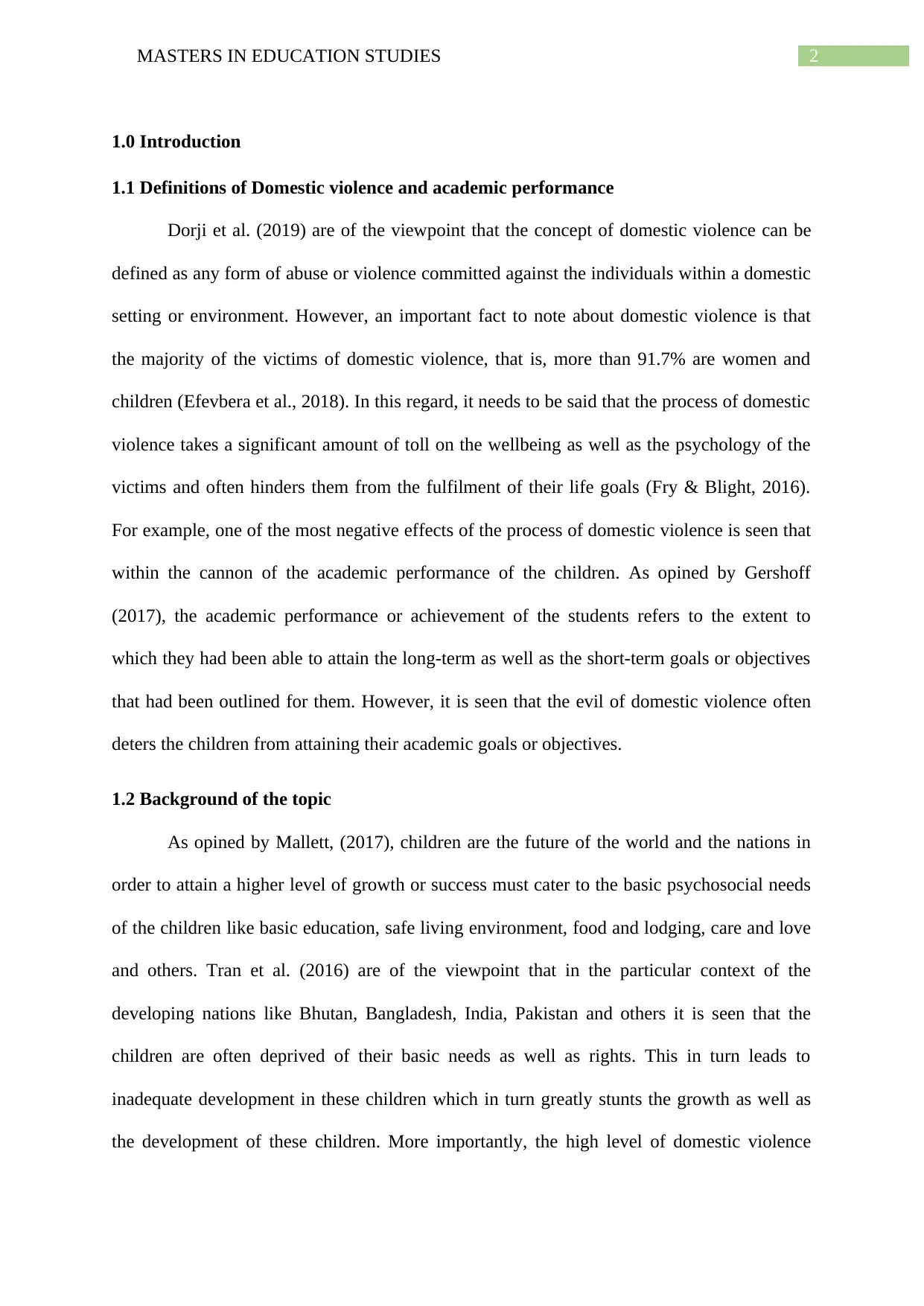
2MASTERS IN EDUCATION STUDIES
1.0 Introduction
1.1 Definitions of Domestic violence and academic performance
Dorji et al. (2019) are of the viewpoint that the concept of domestic violence can be
defined as any form of abuse or violence committed against the individuals within a domestic
setting or environment. However, an important fact to note about domestic violence is that
the majority of the victims of domestic violence, that is, more than 91.7% are women and
children (Efevbera et al., 2018). In this regard, it needs to be said that the process of domestic
violence takes a significant amount of toll on the wellbeing as well as the psychology of the
victims and often hinders them from the fulfilment of their life goals (Fry & Blight, 2016).
For example, one of the most negative effects of the process of domestic violence is seen that
within the cannon of the academic performance of the children. As opined by Gershoff
(2017), the academic performance or achievement of the students refers to the extent to
which they had been able to attain the long-term as well as the short-term goals or objectives
that had been outlined for them. However, it is seen that the evil of domestic violence often
deters the children from attaining their academic goals or objectives.
1.2 Background of the topic
As opined by Mallett, (2017), children are the future of the world and the nations in
order to attain a higher level of growth or success must cater to the basic psychosocial needs
of the children like basic education, safe living environment, food and lodging, care and love
and others. Tran et al. (2016) are of the viewpoint that in the particular context of the
developing nations like Bhutan, Bangladesh, India, Pakistan and others it is seen that the
children are often deprived of their basic needs as well as rights. This in turn leads to
inadequate development in these children which in turn greatly stunts the growth as well as
the development of these children. More importantly, the high level of domestic violence
1.0 Introduction
1.1 Definitions of Domestic violence and academic performance
Dorji et al. (2019) are of the viewpoint that the concept of domestic violence can be
defined as any form of abuse or violence committed against the individuals within a domestic
setting or environment. However, an important fact to note about domestic violence is that
the majority of the victims of domestic violence, that is, more than 91.7% are women and
children (Efevbera et al., 2018). In this regard, it needs to be said that the process of domestic
violence takes a significant amount of toll on the wellbeing as well as the psychology of the
victims and often hinders them from the fulfilment of their life goals (Fry & Blight, 2016).
For example, one of the most negative effects of the process of domestic violence is seen that
within the cannon of the academic performance of the children. As opined by Gershoff
(2017), the academic performance or achievement of the students refers to the extent to
which they had been able to attain the long-term as well as the short-term goals or objectives
that had been outlined for them. However, it is seen that the evil of domestic violence often
deters the children from attaining their academic goals or objectives.
1.2 Background of the topic
As opined by Mallett, (2017), children are the future of the world and the nations in
order to attain a higher level of growth or success must cater to the basic psychosocial needs
of the children like basic education, safe living environment, food and lodging, care and love
and others. Tran et al. (2016) are of the viewpoint that in the particular context of the
developing nations like Bhutan, Bangladesh, India, Pakistan and others it is seen that the
children are often deprived of their basic needs as well as rights. This in turn leads to
inadequate development in these children which in turn greatly stunts the growth as well as
the development of these children. More importantly, the high level of domestic violence
⊘ This is a preview!⊘
Do you want full access?
Subscribe today to unlock all pages.

Trusted by 1+ million students worldwide
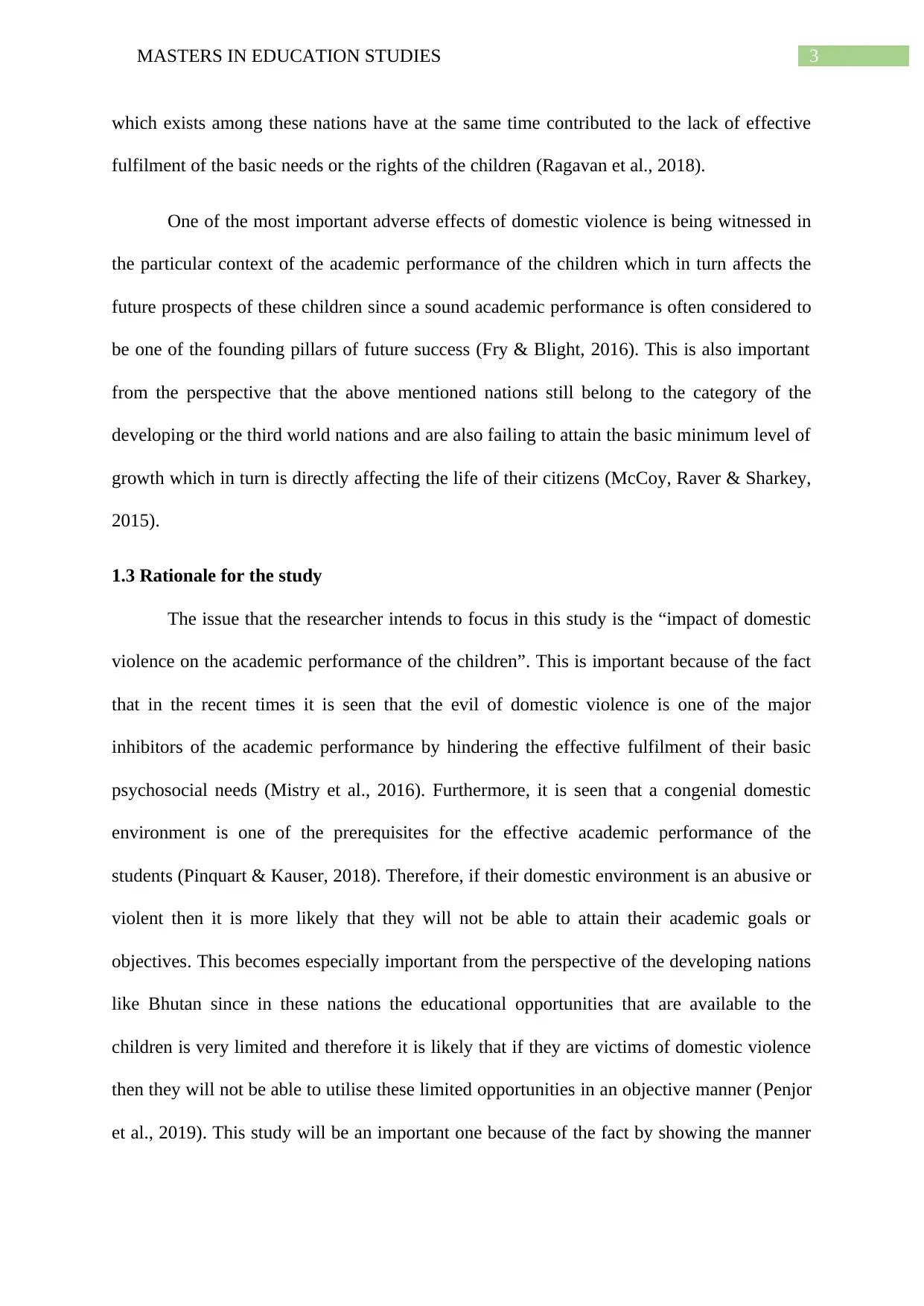
3MASTERS IN EDUCATION STUDIES
which exists among these nations have at the same time contributed to the lack of effective
fulfilment of the basic needs or the rights of the children (Ragavan et al., 2018).
One of the most important adverse effects of domestic violence is being witnessed in
the particular context of the academic performance of the children which in turn affects the
future prospects of these children since a sound academic performance is often considered to
be one of the founding pillars of future success (Fry & Blight, 2016). This is also important
from the perspective that the above mentioned nations still belong to the category of the
developing or the third world nations and are also failing to attain the basic minimum level of
growth which in turn is directly affecting the life of their citizens (McCoy, Raver & Sharkey,
2015).
1.3 Rationale for the study
The issue that the researcher intends to focus in this study is the “impact of domestic
violence on the academic performance of the children”. This is important because of the fact
that in the recent times it is seen that the evil of domestic violence is one of the major
inhibitors of the academic performance by hindering the effective fulfilment of their basic
psychosocial needs (Mistry et al., 2016). Furthermore, it is seen that a congenial domestic
environment is one of the prerequisites for the effective academic performance of the
students (Pinquart & Kauser, 2018). Therefore, if their domestic environment is an abusive or
violent then it is more likely that they will not be able to attain their academic goals or
objectives. This becomes especially important from the perspective of the developing nations
like Bhutan since in these nations the educational opportunities that are available to the
children is very limited and therefore it is likely that if they are victims of domestic violence
then they will not be able to utilise these limited opportunities in an objective manner (Penjor
et al., 2019). This study will be an important one because of the fact by showing the manner
which exists among these nations have at the same time contributed to the lack of effective
fulfilment of the basic needs or the rights of the children (Ragavan et al., 2018).
One of the most important adverse effects of domestic violence is being witnessed in
the particular context of the academic performance of the children which in turn affects the
future prospects of these children since a sound academic performance is often considered to
be one of the founding pillars of future success (Fry & Blight, 2016). This is also important
from the perspective that the above mentioned nations still belong to the category of the
developing or the third world nations and are also failing to attain the basic minimum level of
growth which in turn is directly affecting the life of their citizens (McCoy, Raver & Sharkey,
2015).
1.3 Rationale for the study
The issue that the researcher intends to focus in this study is the “impact of domestic
violence on the academic performance of the children”. This is important because of the fact
that in the recent times it is seen that the evil of domestic violence is one of the major
inhibitors of the academic performance by hindering the effective fulfilment of their basic
psychosocial needs (Mistry et al., 2016). Furthermore, it is seen that a congenial domestic
environment is one of the prerequisites for the effective academic performance of the
students (Pinquart & Kauser, 2018). Therefore, if their domestic environment is an abusive or
violent then it is more likely that they will not be able to attain their academic goals or
objectives. This becomes especially important from the perspective of the developing nations
like Bhutan since in these nations the educational opportunities that are available to the
children is very limited and therefore it is likely that if they are victims of domestic violence
then they will not be able to utilise these limited opportunities in an objective manner (Penjor
et al., 2019). This study will be an important one because of the fact by showing the manner
Paraphrase This Document
Need a fresh take? Get an instant paraphrase of this document with our AI Paraphraser

4MASTERS IN EDUCATION STUDIES
in which the evil of domestic violence affects the academic performance of the children it
will advocate for the same.
1.4 Research Aim
The aim of this research is to analyse the impact of domestic violence on the
academic performance of the children in the particular context of the developing nations like
Bhutan.
1.5 Research Objectives
1. To understand the relation between domestic violence and the academic performance
of children in the particular context of the nation of Bhutan
2. To evaluate the manner in which domestic violence affects the academic performance
of the children in the particular context of the nation of Bhutan
3. To recommend ways through which the academic performance of the children who
have been the victims of domestic violence can be improved
1.6 Research Questions
1. What is the relation between domestic violence and the academic performance of
children in nations like Bhutan?
2. How does domestic violence affect the academic performance of children in nations
like Bhutan?
3. What are the ways through which the academic performance of children who had
been the victims of domestic violence can be improved?
2.0 Method
2.1 Literature Search
The researcher had begun by searching for relevant literature related to the topic
under discussion here through the use of different online database like Google Scholar and
in which the evil of domestic violence affects the academic performance of the children it
will advocate for the same.
1.4 Research Aim
The aim of this research is to analyse the impact of domestic violence on the
academic performance of the children in the particular context of the developing nations like
Bhutan.
1.5 Research Objectives
1. To understand the relation between domestic violence and the academic performance
of children in the particular context of the nation of Bhutan
2. To evaluate the manner in which domestic violence affects the academic performance
of the children in the particular context of the nation of Bhutan
3. To recommend ways through which the academic performance of the children who
have been the victims of domestic violence can be improved
1.6 Research Questions
1. What is the relation between domestic violence and the academic performance of
children in nations like Bhutan?
2. How does domestic violence affect the academic performance of children in nations
like Bhutan?
3. What are the ways through which the academic performance of children who had
been the victims of domestic violence can be improved?
2.0 Method
2.1 Literature Search
The researcher had begun by searching for relevant literature related to the topic
under discussion here through the use of different online database like Google Scholar and
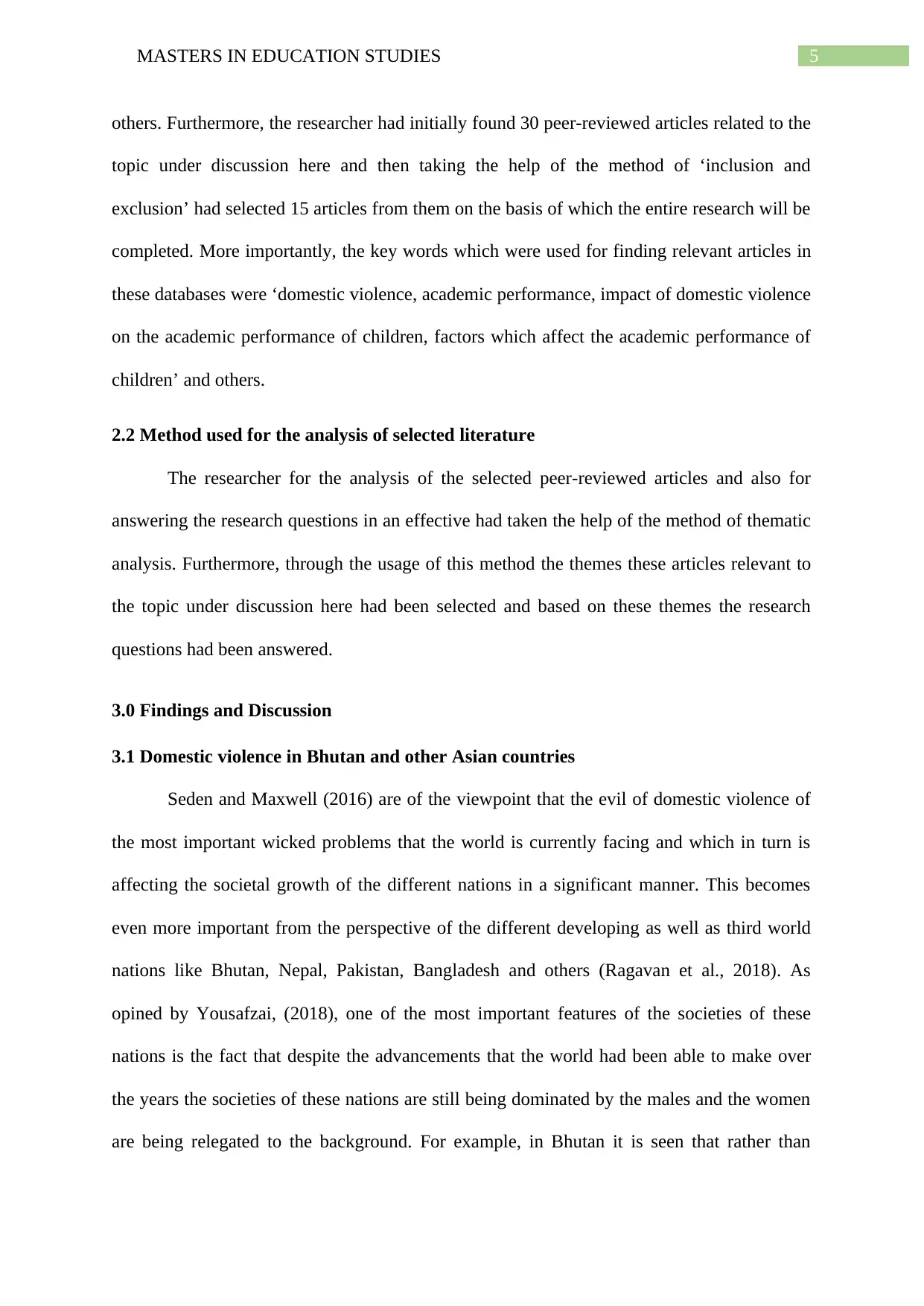
5MASTERS IN EDUCATION STUDIES
others. Furthermore, the researcher had initially found 30 peer-reviewed articles related to the
topic under discussion here and then taking the help of the method of ‘inclusion and
exclusion’ had selected 15 articles from them on the basis of which the entire research will be
completed. More importantly, the key words which were used for finding relevant articles in
these databases were ‘domestic violence, academic performance, impact of domestic violence
on the academic performance of children, factors which affect the academic performance of
children’ and others.
2.2 Method used for the analysis of selected literature
The researcher for the analysis of the selected peer-reviewed articles and also for
answering the research questions in an effective had taken the help of the method of thematic
analysis. Furthermore, through the usage of this method the themes these articles relevant to
the topic under discussion here had been selected and based on these themes the research
questions had been answered.
3.0 Findings and Discussion
3.1 Domestic violence in Bhutan and other Asian countries
Seden and Maxwell (2016) are of the viewpoint that the evil of domestic violence of
the most important wicked problems that the world is currently facing and which in turn is
affecting the societal growth of the different nations in a significant manner. This becomes
even more important from the perspective of the different developing as well as third world
nations like Bhutan, Nepal, Pakistan, Bangladesh and others (Ragavan et al., 2018). As
opined by Yousafzai, (2018), one of the most important features of the societies of these
nations is the fact that despite the advancements that the world had been able to make over
the years the societies of these nations are still being dominated by the males and the women
are being relegated to the background. For example, in Bhutan it is seen that rather than
others. Furthermore, the researcher had initially found 30 peer-reviewed articles related to the
topic under discussion here and then taking the help of the method of ‘inclusion and
exclusion’ had selected 15 articles from them on the basis of which the entire research will be
completed. More importantly, the key words which were used for finding relevant articles in
these databases were ‘domestic violence, academic performance, impact of domestic violence
on the academic performance of children, factors which affect the academic performance of
children’ and others.
2.2 Method used for the analysis of selected literature
The researcher for the analysis of the selected peer-reviewed articles and also for
answering the research questions in an effective had taken the help of the method of thematic
analysis. Furthermore, through the usage of this method the themes these articles relevant to
the topic under discussion here had been selected and based on these themes the research
questions had been answered.
3.0 Findings and Discussion
3.1 Domestic violence in Bhutan and other Asian countries
Seden and Maxwell (2016) are of the viewpoint that the evil of domestic violence of
the most important wicked problems that the world is currently facing and which in turn is
affecting the societal growth of the different nations in a significant manner. This becomes
even more important from the perspective of the different developing as well as third world
nations like Bhutan, Nepal, Pakistan, Bangladesh and others (Ragavan et al., 2018). As
opined by Yousafzai, (2018), one of the most important features of the societies of these
nations is the fact that despite the advancements that the world had been able to make over
the years the societies of these nations are still being dominated by the males and the women
are being relegated to the background. For example, in Bhutan it is seen that rather than
⊘ This is a preview!⊘
Do you want full access?
Subscribe today to unlock all pages.

Trusted by 1+ million students worldwide
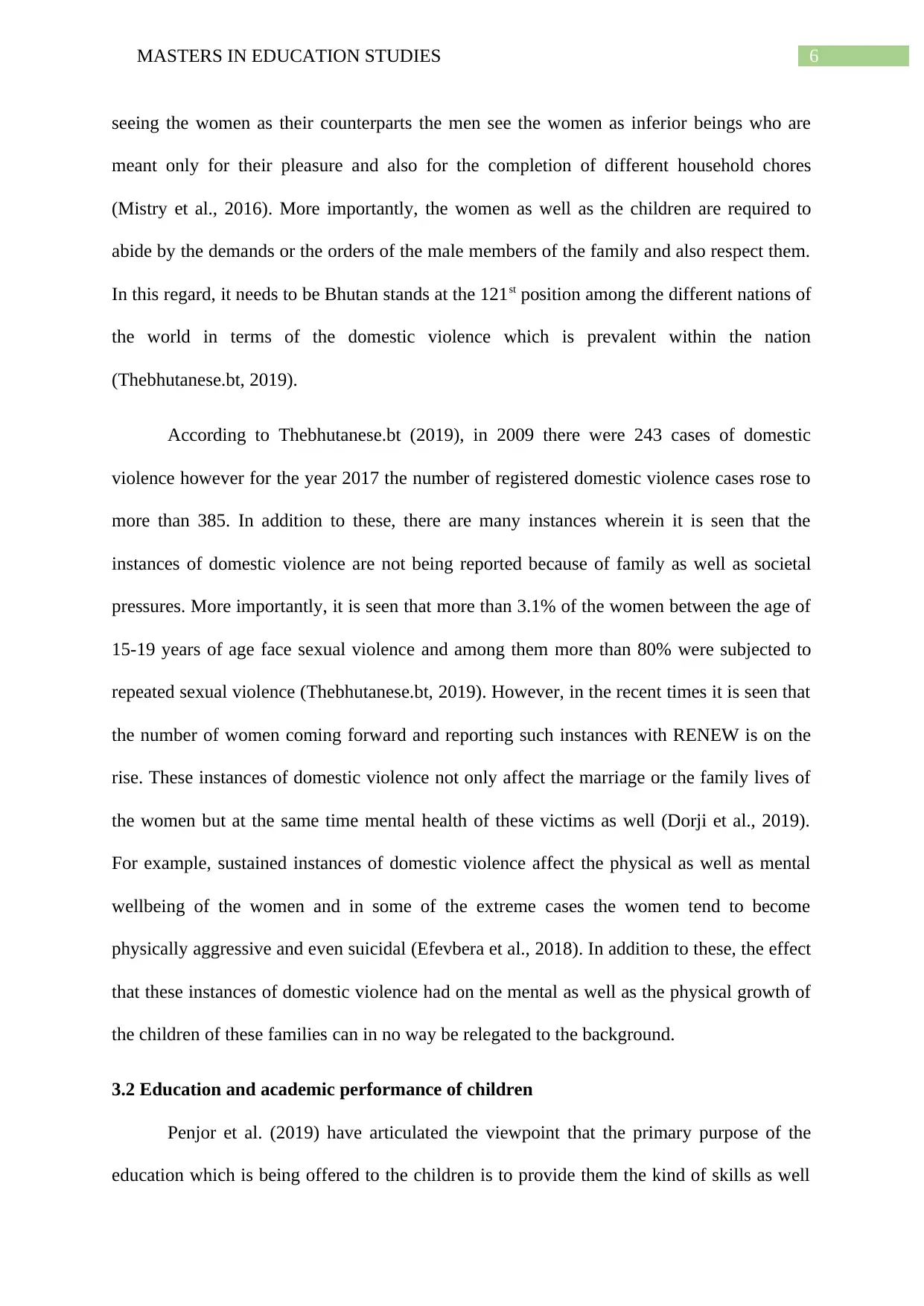
6MASTERS IN EDUCATION STUDIES
seeing the women as their counterparts the men see the women as inferior beings who are
meant only for their pleasure and also for the completion of different household chores
(Mistry et al., 2016). More importantly, the women as well as the children are required to
abide by the demands or the orders of the male members of the family and also respect them.
In this regard, it needs to be Bhutan stands at the 121st position among the different nations of
the world in terms of the domestic violence which is prevalent within the nation
(Thebhutanese.bt, 2019).
According to Thebhutanese.bt (2019), in 2009 there were 243 cases of domestic
violence however for the year 2017 the number of registered domestic violence cases rose to
more than 385. In addition to these, there are many instances wherein it is seen that the
instances of domestic violence are not being reported because of family as well as societal
pressures. More importantly, it is seen that more than 3.1% of the women between the age of
15-19 years of age face sexual violence and among them more than 80% were subjected to
repeated sexual violence (Thebhutanese.bt, 2019). However, in the recent times it is seen that
the number of women coming forward and reporting such instances with RENEW is on the
rise. These instances of domestic violence not only affect the marriage or the family lives of
the women but at the same time mental health of these victims as well (Dorji et al., 2019).
For example, sustained instances of domestic violence affect the physical as well as mental
wellbeing of the women and in some of the extreme cases the women tend to become
physically aggressive and even suicidal (Efevbera et al., 2018). In addition to these, the effect
that these instances of domestic violence had on the mental as well as the physical growth of
the children of these families can in no way be relegated to the background.
3.2 Education and academic performance of children
Penjor et al. (2019) have articulated the viewpoint that the primary purpose of the
education which is being offered to the children is to provide them the kind of skills as well
seeing the women as their counterparts the men see the women as inferior beings who are
meant only for their pleasure and also for the completion of different household chores
(Mistry et al., 2016). More importantly, the women as well as the children are required to
abide by the demands or the orders of the male members of the family and also respect them.
In this regard, it needs to be Bhutan stands at the 121st position among the different nations of
the world in terms of the domestic violence which is prevalent within the nation
(Thebhutanese.bt, 2019).
According to Thebhutanese.bt (2019), in 2009 there were 243 cases of domestic
violence however for the year 2017 the number of registered domestic violence cases rose to
more than 385. In addition to these, there are many instances wherein it is seen that the
instances of domestic violence are not being reported because of family as well as societal
pressures. More importantly, it is seen that more than 3.1% of the women between the age of
15-19 years of age face sexual violence and among them more than 80% were subjected to
repeated sexual violence (Thebhutanese.bt, 2019). However, in the recent times it is seen that
the number of women coming forward and reporting such instances with RENEW is on the
rise. These instances of domestic violence not only affect the marriage or the family lives of
the women but at the same time mental health of these victims as well (Dorji et al., 2019).
For example, sustained instances of domestic violence affect the physical as well as mental
wellbeing of the women and in some of the extreme cases the women tend to become
physically aggressive and even suicidal (Efevbera et al., 2018). In addition to these, the effect
that these instances of domestic violence had on the mental as well as the physical growth of
the children of these families can in no way be relegated to the background.
3.2 Education and academic performance of children
Penjor et al. (2019) have articulated the viewpoint that the primary purpose of the
education which is being offered to the children is to provide them the kind of skills as well
Paraphrase This Document
Need a fresh take? Get an instant paraphrase of this document with our AI Paraphraser
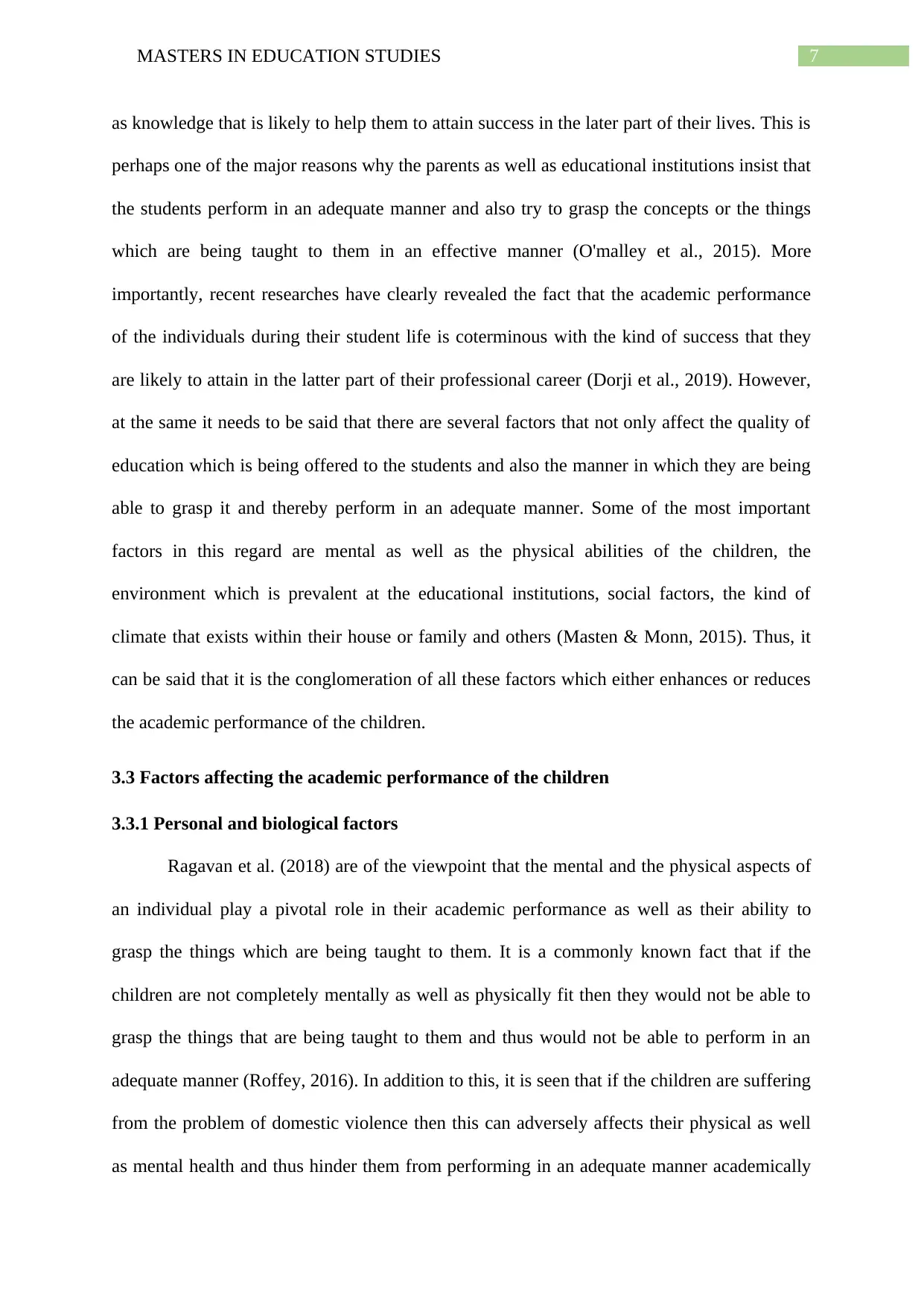
7MASTERS IN EDUCATION STUDIES
as knowledge that is likely to help them to attain success in the later part of their lives. This is
perhaps one of the major reasons why the parents as well as educational institutions insist that
the students perform in an adequate manner and also try to grasp the concepts or the things
which are being taught to them in an effective manner (O'malley et al., 2015). More
importantly, recent researches have clearly revealed the fact that the academic performance
of the individuals during their student life is coterminous with the kind of success that they
are likely to attain in the latter part of their professional career (Dorji et al., 2019). However,
at the same it needs to be said that there are several factors that not only affect the quality of
education which is being offered to the students and also the manner in which they are being
able to grasp it and thereby perform in an adequate manner. Some of the most important
factors in this regard are mental as well as the physical abilities of the children, the
environment which is prevalent at the educational institutions, social factors, the kind of
climate that exists within their house or family and others (Masten & Monn, 2015). Thus, it
can be said that it is the conglomeration of all these factors which either enhances or reduces
the academic performance of the children.
3.3 Factors affecting the academic performance of the children
3.3.1 Personal and biological factors
Ragavan et al. (2018) are of the viewpoint that the mental and the physical aspects of
an individual play a pivotal role in their academic performance as well as their ability to
grasp the things which are being taught to them. It is a commonly known fact that if the
children are not completely mentally as well as physically fit then they would not be able to
grasp the things that are being taught to them and thus would not be able to perform in an
adequate manner (Roffey, 2016). In addition to this, it is seen that if the children are suffering
from the problem of domestic violence then this can adversely affects their physical as well
as mental health and thus hinder them from performing in an adequate manner academically
as knowledge that is likely to help them to attain success in the later part of their lives. This is
perhaps one of the major reasons why the parents as well as educational institutions insist that
the students perform in an adequate manner and also try to grasp the concepts or the things
which are being taught to them in an effective manner (O'malley et al., 2015). More
importantly, recent researches have clearly revealed the fact that the academic performance
of the individuals during their student life is coterminous with the kind of success that they
are likely to attain in the latter part of their professional career (Dorji et al., 2019). However,
at the same it needs to be said that there are several factors that not only affect the quality of
education which is being offered to the students and also the manner in which they are being
able to grasp it and thereby perform in an adequate manner. Some of the most important
factors in this regard are mental as well as the physical abilities of the children, the
environment which is prevalent at the educational institutions, social factors, the kind of
climate that exists within their house or family and others (Masten & Monn, 2015). Thus, it
can be said that it is the conglomeration of all these factors which either enhances or reduces
the academic performance of the children.
3.3 Factors affecting the academic performance of the children
3.3.1 Personal and biological factors
Ragavan et al. (2018) are of the viewpoint that the mental and the physical aspects of
an individual play a pivotal role in their academic performance as well as their ability to
grasp the things which are being taught to them. It is a commonly known fact that if the
children are not completely mentally as well as physically fit then they would not be able to
grasp the things that are being taught to them and thus would not be able to perform in an
adequate manner (Roffey, 2016). In addition to this, it is seen that if the children are suffering
from the problem of domestic violence then this can adversely affects their physical as well
as mental health and thus hinder them from performing in an adequate manner academically
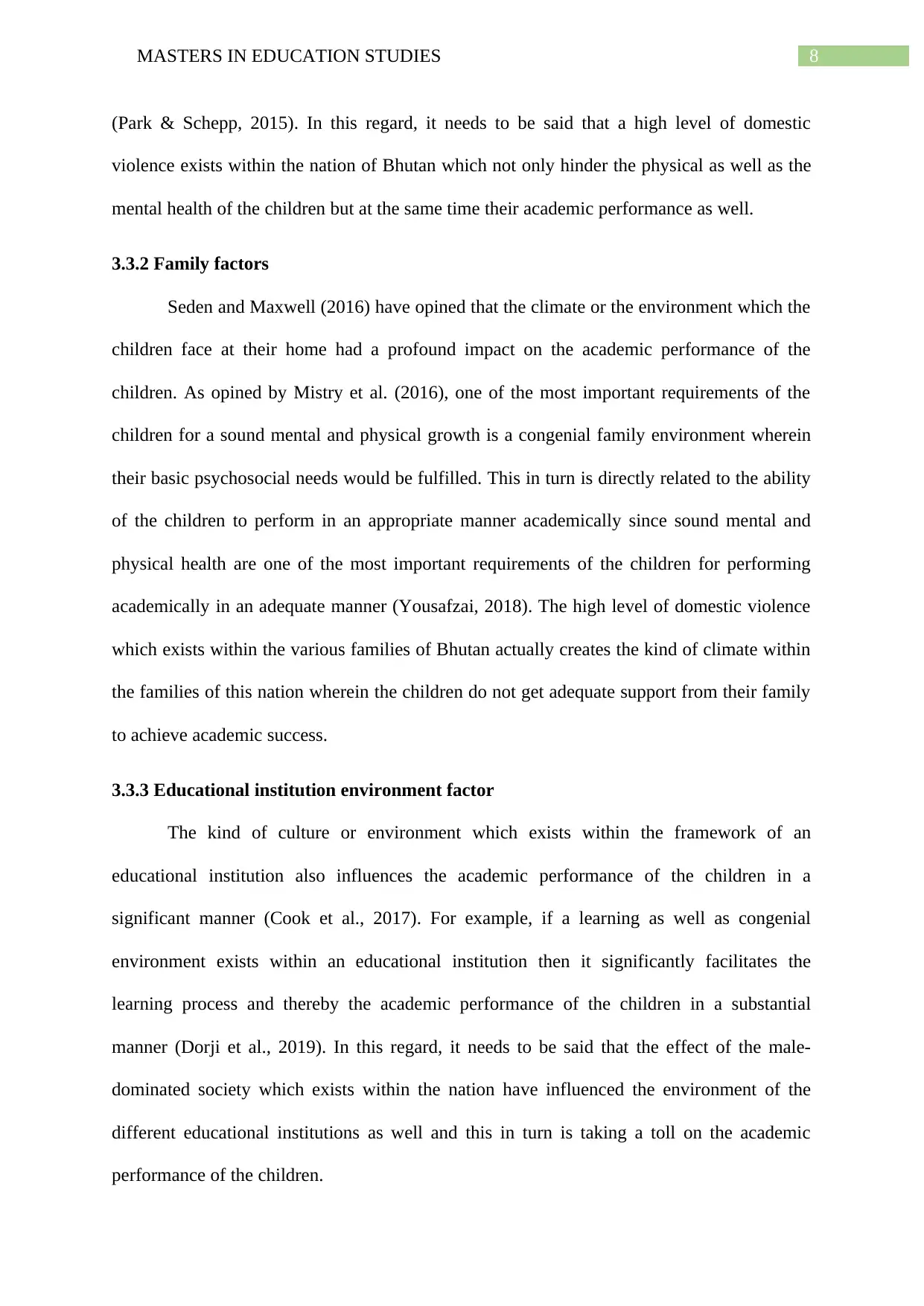
8MASTERS IN EDUCATION STUDIES
(Park & Schepp, 2015). In this regard, it needs to be said that a high level of domestic
violence exists within the nation of Bhutan which not only hinder the physical as well as the
mental health of the children but at the same time their academic performance as well.
3.3.2 Family factors
Seden and Maxwell (2016) have opined that the climate or the environment which the
children face at their home had a profound impact on the academic performance of the
children. As opined by Mistry et al. (2016), one of the most important requirements of the
children for a sound mental and physical growth is a congenial family environment wherein
their basic psychosocial needs would be fulfilled. This in turn is directly related to the ability
of the children to perform in an appropriate manner academically since sound mental and
physical health are one of the most important requirements of the children for performing
academically in an adequate manner (Yousafzai, 2018). The high level of domestic violence
which exists within the various families of Bhutan actually creates the kind of climate within
the families of this nation wherein the children do not get adequate support from their family
to achieve academic success.
3.3.3 Educational institution environment factor
The kind of culture or environment which exists within the framework of an
educational institution also influences the academic performance of the children in a
significant manner (Cook et al., 2017). For example, if a learning as well as congenial
environment exists within an educational institution then it significantly facilitates the
learning process and thereby the academic performance of the children in a substantial
manner (Dorji et al., 2019). In this regard, it needs to be said that the effect of the male-
dominated society which exists within the nation have influenced the environment of the
different educational institutions as well and this in turn is taking a toll on the academic
performance of the children.
(Park & Schepp, 2015). In this regard, it needs to be said that a high level of domestic
violence exists within the nation of Bhutan which not only hinder the physical as well as the
mental health of the children but at the same time their academic performance as well.
3.3.2 Family factors
Seden and Maxwell (2016) have opined that the climate or the environment which the
children face at their home had a profound impact on the academic performance of the
children. As opined by Mistry et al. (2016), one of the most important requirements of the
children for a sound mental and physical growth is a congenial family environment wherein
their basic psychosocial needs would be fulfilled. This in turn is directly related to the ability
of the children to perform in an appropriate manner academically since sound mental and
physical health are one of the most important requirements of the children for performing
academically in an adequate manner (Yousafzai, 2018). The high level of domestic violence
which exists within the various families of Bhutan actually creates the kind of climate within
the families of this nation wherein the children do not get adequate support from their family
to achieve academic success.
3.3.3 Educational institution environment factor
The kind of culture or environment which exists within the framework of an
educational institution also influences the academic performance of the children in a
significant manner (Cook et al., 2017). For example, if a learning as well as congenial
environment exists within an educational institution then it significantly facilitates the
learning process and thereby the academic performance of the children in a substantial
manner (Dorji et al., 2019). In this regard, it needs to be said that the effect of the male-
dominated society which exists within the nation have influenced the environment of the
different educational institutions as well and this in turn is taking a toll on the academic
performance of the children.
⊘ This is a preview!⊘
Do you want full access?
Subscribe today to unlock all pages.

Trusted by 1+ million students worldwide
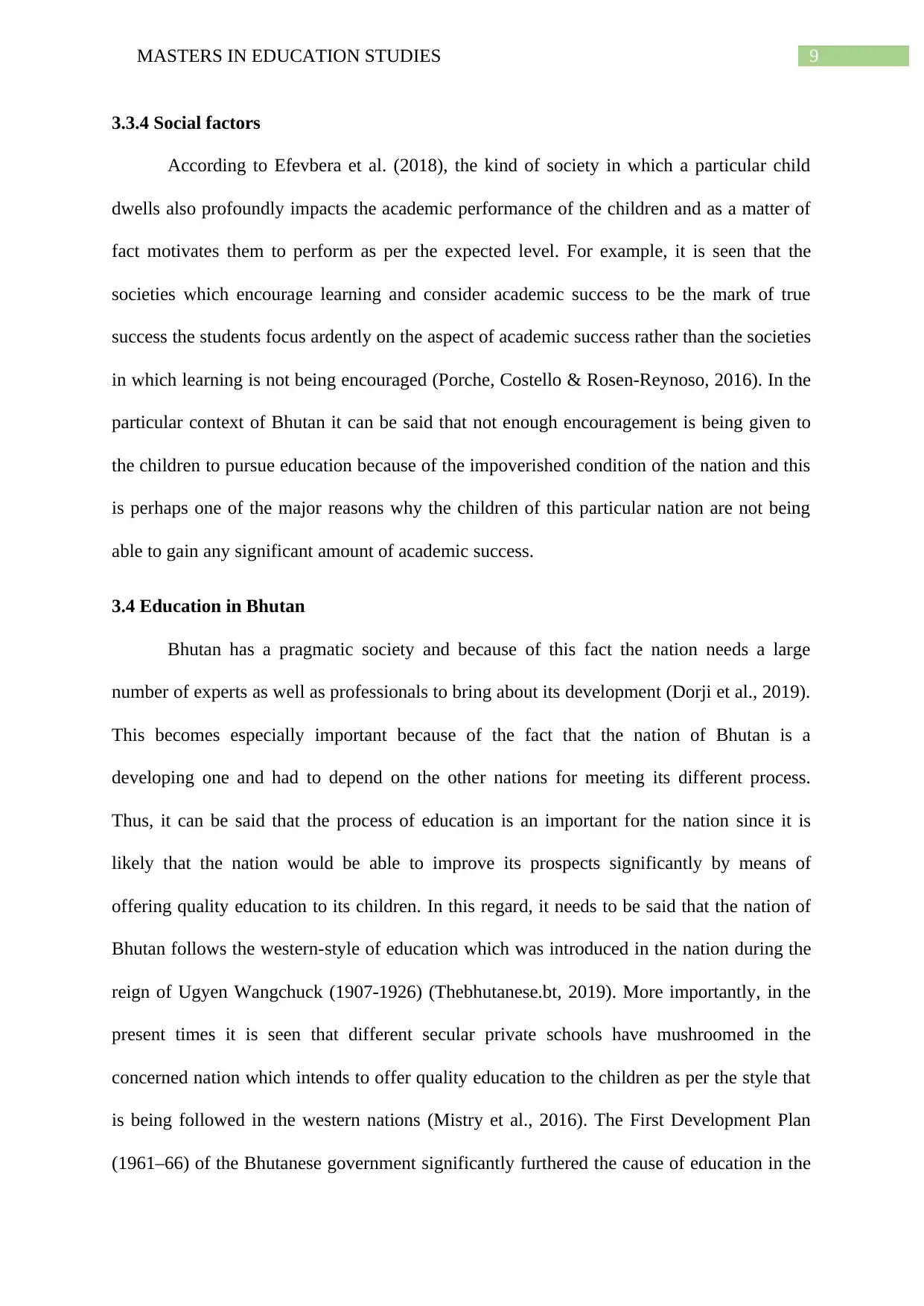
9MASTERS IN EDUCATION STUDIES
3.3.4 Social factors
According to Efevbera et al. (2018), the kind of society in which a particular child
dwells also profoundly impacts the academic performance of the children and as a matter of
fact motivates them to perform as per the expected level. For example, it is seen that the
societies which encourage learning and consider academic success to be the mark of true
success the students focus ardently on the aspect of academic success rather than the societies
in which learning is not being encouraged (Porche, Costello & Rosen-Reynoso, 2016). In the
particular context of Bhutan it can be said that not enough encouragement is being given to
the children to pursue education because of the impoverished condition of the nation and this
is perhaps one of the major reasons why the children of this particular nation are not being
able to gain any significant amount of academic success.
3.4 Education in Bhutan
Bhutan has a pragmatic society and because of this fact the nation needs a large
number of experts as well as professionals to bring about its development (Dorji et al., 2019).
This becomes especially important because of the fact that the nation of Bhutan is a
developing one and had to depend on the other nations for meeting its different process.
Thus, it can be said that the process of education is an important for the nation since it is
likely that the nation would be able to improve its prospects significantly by means of
offering quality education to its children. In this regard, it needs to be said that the nation of
Bhutan follows the western-style of education which was introduced in the nation during the
reign of Ugyen Wangchuck (1907-1926) (Thebhutanese.bt, 2019). More importantly, in the
present times it is seen that different secular private schools have mushroomed in the
concerned nation which intends to offer quality education to the children as per the style that
is being followed in the western nations (Mistry et al., 2016). The First Development Plan
(1961–66) of the Bhutanese government significantly furthered the cause of education in the
3.3.4 Social factors
According to Efevbera et al. (2018), the kind of society in which a particular child
dwells also profoundly impacts the academic performance of the children and as a matter of
fact motivates them to perform as per the expected level. For example, it is seen that the
societies which encourage learning and consider academic success to be the mark of true
success the students focus ardently on the aspect of academic success rather than the societies
in which learning is not being encouraged (Porche, Costello & Rosen-Reynoso, 2016). In the
particular context of Bhutan it can be said that not enough encouragement is being given to
the children to pursue education because of the impoverished condition of the nation and this
is perhaps one of the major reasons why the children of this particular nation are not being
able to gain any significant amount of academic success.
3.4 Education in Bhutan
Bhutan has a pragmatic society and because of this fact the nation needs a large
number of experts as well as professionals to bring about its development (Dorji et al., 2019).
This becomes especially important because of the fact that the nation of Bhutan is a
developing one and had to depend on the other nations for meeting its different process.
Thus, it can be said that the process of education is an important for the nation since it is
likely that the nation would be able to improve its prospects significantly by means of
offering quality education to its children. In this regard, it needs to be said that the nation of
Bhutan follows the western-style of education which was introduced in the nation during the
reign of Ugyen Wangchuck (1907-1926) (Thebhutanese.bt, 2019). More importantly, in the
present times it is seen that different secular private schools have mushroomed in the
concerned nation which intends to offer quality education to the children as per the style that
is being followed in the western nations (Mistry et al., 2016). The First Development Plan
(1961–66) of the Bhutanese government significantly furthered the cause of education in the
Paraphrase This Document
Need a fresh take? Get an instant paraphrase of this document with our AI Paraphraser
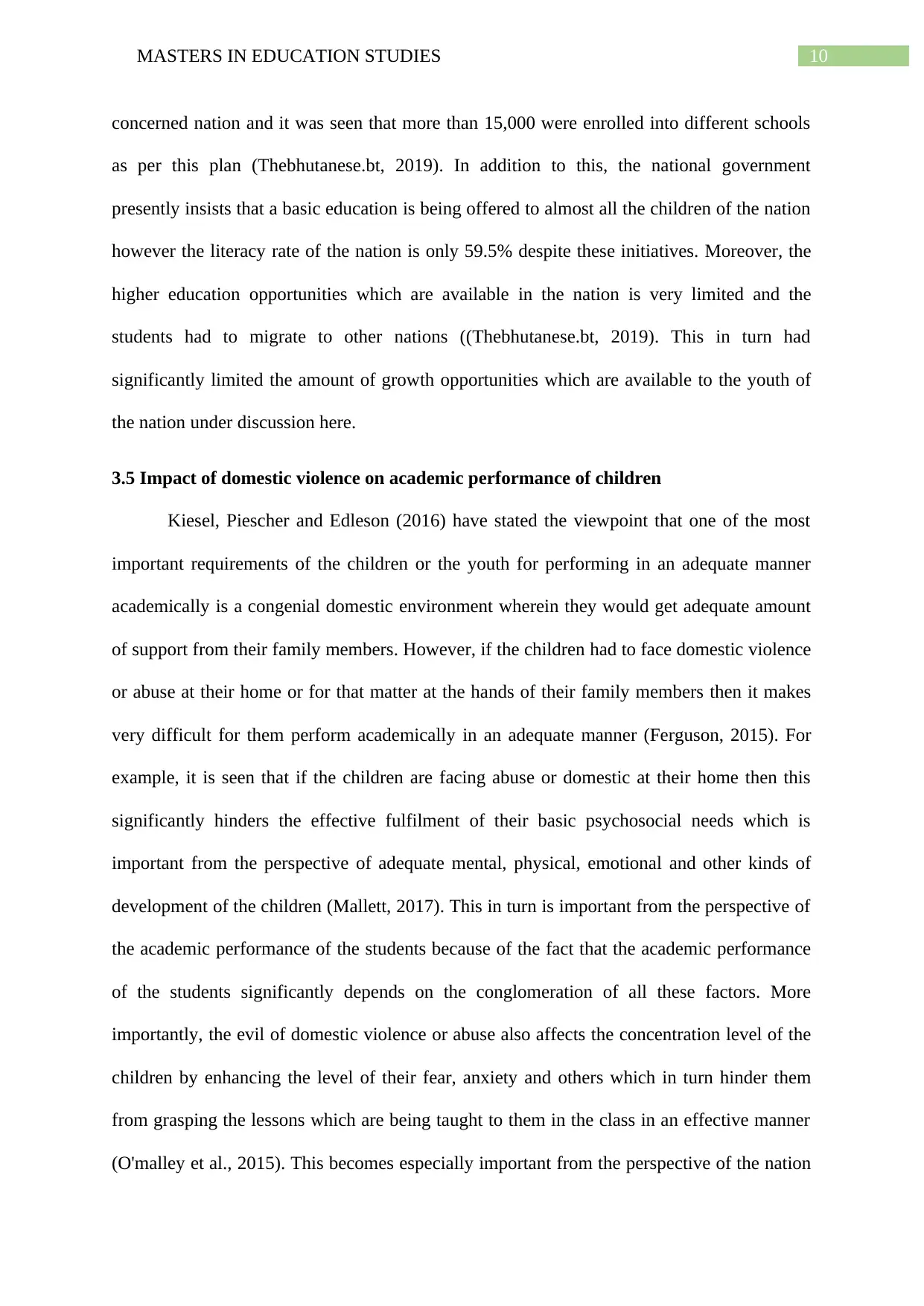
10MASTERS IN EDUCATION STUDIES
concerned nation and it was seen that more than 15,000 were enrolled into different schools
as per this plan (Thebhutanese.bt, 2019). In addition to this, the national government
presently insists that a basic education is being offered to almost all the children of the nation
however the literacy rate of the nation is only 59.5% despite these initiatives. Moreover, the
higher education opportunities which are available in the nation is very limited and the
students had to migrate to other nations ((Thebhutanese.bt, 2019). This in turn had
significantly limited the amount of growth opportunities which are available to the youth of
the nation under discussion here.
3.5 Impact of domestic violence on academic performance of children
Kiesel, Piescher and Edleson (2016) have stated the viewpoint that one of the most
important requirements of the children or the youth for performing in an adequate manner
academically is a congenial domestic environment wherein they would get adequate amount
of support from their family members. However, if the children had to face domestic violence
or abuse at their home or for that matter at the hands of their family members then it makes
very difficult for them perform academically in an adequate manner (Ferguson, 2015). For
example, it is seen that if the children are facing abuse or domestic at their home then this
significantly hinders the effective fulfilment of their basic psychosocial needs which is
important from the perspective of adequate mental, physical, emotional and other kinds of
development of the children (Mallett, 2017). This in turn is important from the perspective of
the academic performance of the students because of the fact that the academic performance
of the students significantly depends on the conglomeration of all these factors. More
importantly, the evil of domestic violence or abuse also affects the concentration level of the
children by enhancing the level of their fear, anxiety and others which in turn hinder them
from grasping the lessons which are being taught to them in the class in an effective manner
(O'malley et al., 2015). This becomes especially important from the perspective of the nation
concerned nation and it was seen that more than 15,000 were enrolled into different schools
as per this plan (Thebhutanese.bt, 2019). In addition to this, the national government
presently insists that a basic education is being offered to almost all the children of the nation
however the literacy rate of the nation is only 59.5% despite these initiatives. Moreover, the
higher education opportunities which are available in the nation is very limited and the
students had to migrate to other nations ((Thebhutanese.bt, 2019). This in turn had
significantly limited the amount of growth opportunities which are available to the youth of
the nation under discussion here.
3.5 Impact of domestic violence on academic performance of children
Kiesel, Piescher and Edleson (2016) have stated the viewpoint that one of the most
important requirements of the children or the youth for performing in an adequate manner
academically is a congenial domestic environment wherein they would get adequate amount
of support from their family members. However, if the children had to face domestic violence
or abuse at their home or for that matter at the hands of their family members then it makes
very difficult for them perform academically in an adequate manner (Ferguson, 2015). For
example, it is seen that if the children are facing abuse or domestic at their home then this
significantly hinders the effective fulfilment of their basic psychosocial needs which is
important from the perspective of adequate mental, physical, emotional and other kinds of
development of the children (Mallett, 2017). This in turn is important from the perspective of
the academic performance of the students because of the fact that the academic performance
of the students significantly depends on the conglomeration of all these factors. More
importantly, the evil of domestic violence or abuse also affects the concentration level of the
children by enhancing the level of their fear, anxiety and others which in turn hinder them
from grasping the lessons which are being taught to them in the class in an effective manner
(O'malley et al., 2015). This becomes especially important from the perspective of the nation
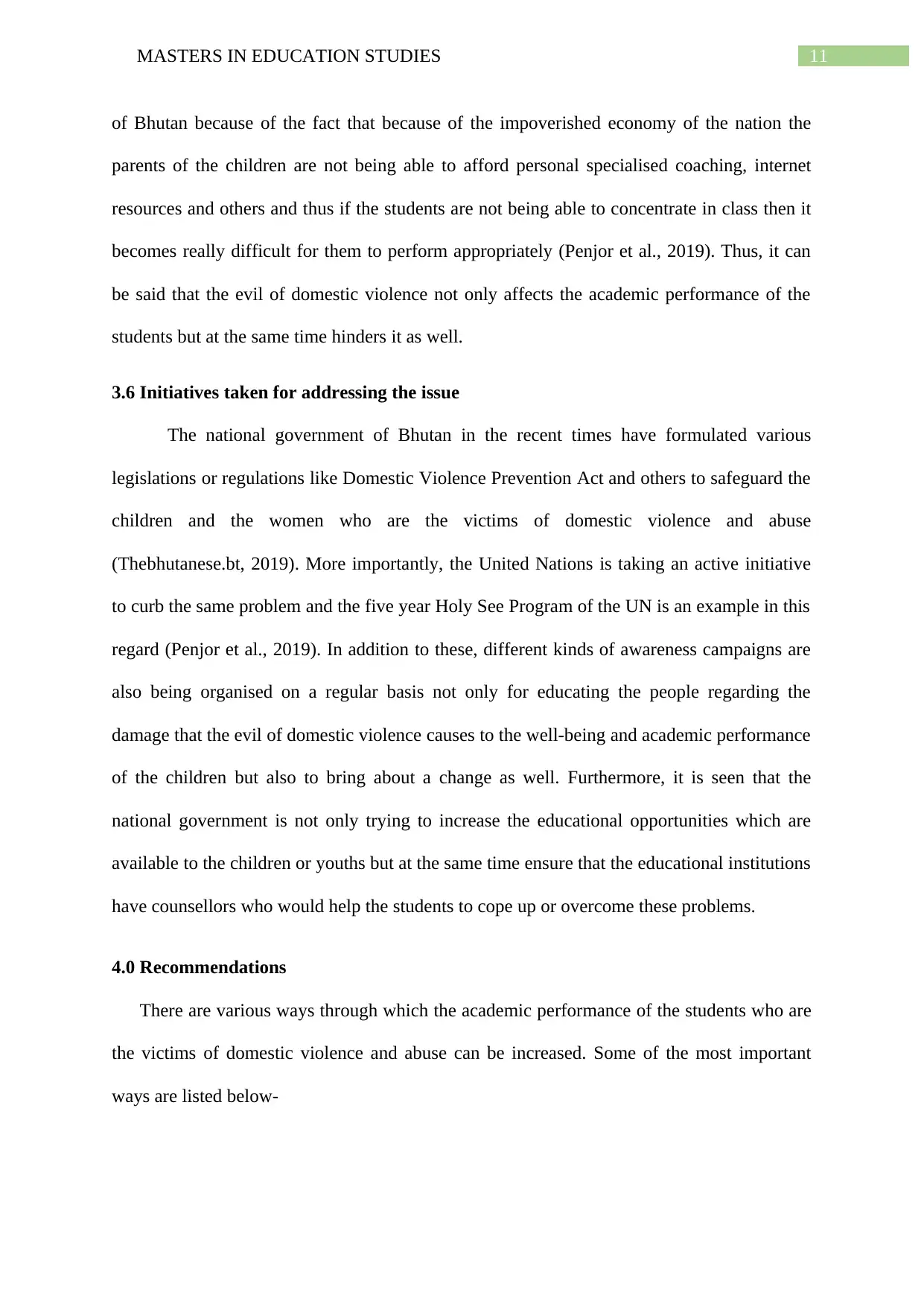
11MASTERS IN EDUCATION STUDIES
of Bhutan because of the fact that because of the impoverished economy of the nation the
parents of the children are not being able to afford personal specialised coaching, internet
resources and others and thus if the students are not being able to concentrate in class then it
becomes really difficult for them to perform appropriately (Penjor et al., 2019). Thus, it can
be said that the evil of domestic violence not only affects the academic performance of the
students but at the same time hinders it as well.
3.6 Initiatives taken for addressing the issue
The national government of Bhutan in the recent times have formulated various
legislations or regulations like Domestic Violence Prevention Act and others to safeguard the
children and the women who are the victims of domestic violence and abuse
(Thebhutanese.bt, 2019). More importantly, the United Nations is taking an active initiative
to curb the same problem and the five year Holy See Program of the UN is an example in this
regard (Penjor et al., 2019). In addition to these, different kinds of awareness campaigns are
also being organised on a regular basis not only for educating the people regarding the
damage that the evil of domestic violence causes to the well-being and academic performance
of the children but also to bring about a change as well. Furthermore, it is seen that the
national government is not only trying to increase the educational opportunities which are
available to the children or youths but at the same time ensure that the educational institutions
have counsellors who would help the students to cope up or overcome these problems.
4.0 Recommendations
There are various ways through which the academic performance of the students who are
the victims of domestic violence and abuse can be increased. Some of the most important
ways are listed below-
of Bhutan because of the fact that because of the impoverished economy of the nation the
parents of the children are not being able to afford personal specialised coaching, internet
resources and others and thus if the students are not being able to concentrate in class then it
becomes really difficult for them to perform appropriately (Penjor et al., 2019). Thus, it can
be said that the evil of domestic violence not only affects the academic performance of the
students but at the same time hinders it as well.
3.6 Initiatives taken for addressing the issue
The national government of Bhutan in the recent times have formulated various
legislations or regulations like Domestic Violence Prevention Act and others to safeguard the
children and the women who are the victims of domestic violence and abuse
(Thebhutanese.bt, 2019). More importantly, the United Nations is taking an active initiative
to curb the same problem and the five year Holy See Program of the UN is an example in this
regard (Penjor et al., 2019). In addition to these, different kinds of awareness campaigns are
also being organised on a regular basis not only for educating the people regarding the
damage that the evil of domestic violence causes to the well-being and academic performance
of the children but also to bring about a change as well. Furthermore, it is seen that the
national government is not only trying to increase the educational opportunities which are
available to the children or youths but at the same time ensure that the educational institutions
have counsellors who would help the students to cope up or overcome these problems.
4.0 Recommendations
There are various ways through which the academic performance of the students who are
the victims of domestic violence and abuse can be increased. Some of the most important
ways are listed below-
⊘ This is a preview!⊘
Do you want full access?
Subscribe today to unlock all pages.

Trusted by 1+ million students worldwide
1 out of 16
Related Documents
Your All-in-One AI-Powered Toolkit for Academic Success.
+13062052269
info@desklib.com
Available 24*7 on WhatsApp / Email
![[object Object]](/_next/static/media/star-bottom.7253800d.svg)
Unlock your academic potential
Copyright © 2020–2026 A2Z Services. All Rights Reserved. Developed and managed by ZUCOL.



